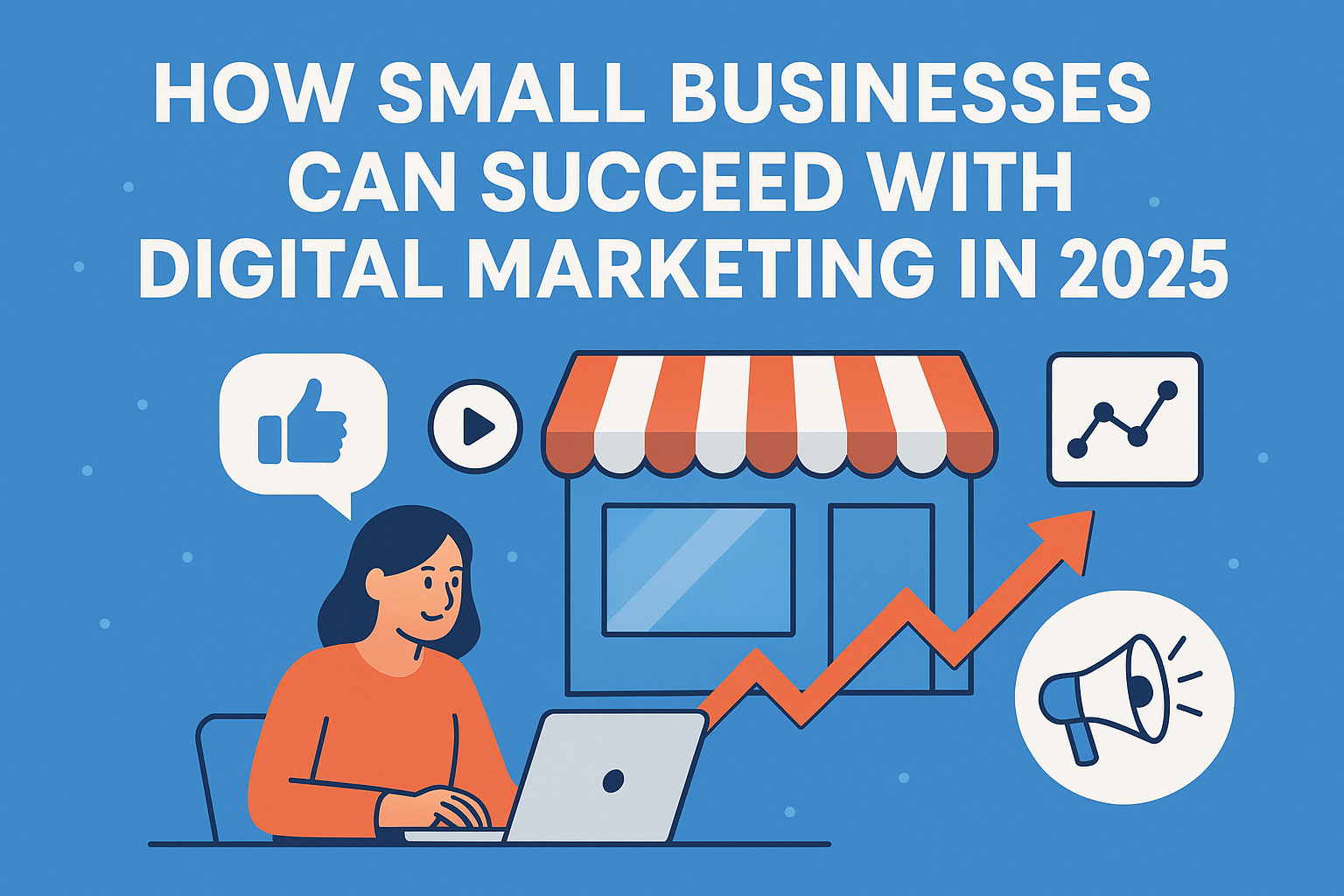
Introduction
In today’s competitive digital age, small businesses must embrace smart and scalable marketing strategies to stay ahead. With limited budgets, fewer resources, and rising competition, the path to success lies in leveraging the power of digital marketing effectively.
This guide breaks down how small businesses can succeed with digital marketing in 2025—using tools, tactics, and trends that are practical, affordable, and proven to drive real results.
Why Digital Marketing Matters for Small Businesses
Digital marketing refers to promoting your products or services through online platforms—search engines, social media, email, websites, and more. For small businesses, it is one of the most powerful tools to:
- Reach a larger audience without breaking the bank
- Compete with larger brands on a local or global level
- Build trust and credibility through consistent online presence
- Get measurable insights and improve campaigns in real-time
In 2025, tools like AI, automation, and personalized content are more accessible than ever, enabling small businesses to punch above their weight.
Identify Your Audience & Goals (Foundation First)
Before spending a single dollar, define who your audience is and what you want to achieve.
Ask questions like:
- Who are your ideal customers?
- What problems are they trying to solve?
- What channels do they use most?
- What keywords or phrases do they search for?
Set clear goals: Do you want more leads? Better brand awareness? Online sales? Defining your objectives and audience helps create focused and effective campaigns.
Build a Strong Digital Marketing Foundation
Optimize Your Website for Search & User Experience
Your website is your digital storefront. It needs to:
- Load fast
- Work flawlessly on mobile devices
- Be optimized for keywords related to your business
- Use proper meta titles, descriptions, headers, and internal links
- Use schema markup to help search engines understand your content better
Leverage Cost-Effective Digital Marketing Channels
Content Marketing & Blogging
Writing helpful blog posts builds trust, improves SEO, and drives traffic. Examples:
- “How to Use Instagram for Local Business”
- “5 Affordable Marketing Tools for Startups”
📌 Tip: Internally link these blogs to services offered on https://elevaize.com.
Social Media Marketing
Focus on the platforms your audience uses. For many small businesses, that’s:
- Facebook & Instagram for B2C
- LinkedIn for B2B
- YouTube or TikTok for tutorials, reviews, and short-form content
Use stories, live sessions, and short videos to engage users directly.
Email Marketing & Direct Outreach
Email remains one of the highest ROI channels. Build a subscriber list by offering:
- Discounts
- Free guides or checklists
- Early access to services
Then, send personalized emails that provide value.
Smart Paid Advertising on a Budget
Start with a small budget using:
- Facebook Ads (great targeting for local businesses)
- Google Ads (for buyer-intent keywords)
Track your results and scale only what works.
Build Trust, Authenticity & Brand Differentiation
As a small business, you have one big advantage: authenticity.
People love real stories, local roots, and a personal touch. Highlight:
- Testimonials from happy customers
- Behind-the-scenes photos or videos
- Your mission and values
This human connection builds trust, which drives sales and referrals.
Avoid Common Mistakes & Pitfalls
Avoid these frequent digital marketing mistakes:
- Trying to be on every platform at once
- Ignoring mobile or voice search
- Running paid ads without tracking performance
- Giving up too early—SEO takes time!
Stay consistent, focused, and data-driven.
How to Measure Success & Adjust Your Strategy
Track these key performance indicators (KPIs):
- Website traffic
- Leads generated
- Conversion rate
- Cost per lead or acquisition
- Social engagement
Use tools like GA4, Hotjar, or your email dashboard to evaluate performance and pivot when needed.
Conclusion
Digital marketing doesn’t have to be overwhelming or expensive. By starting with a solid foundation, choosing the right channels, leveraging tools, and staying authentic, small businesses can thrive online.
You don’t need to do everything at once—start small, be consistent, and track your progress.
👉 Ready to take the first step? Optimize your homepage or launch a simple email campaign today!
Visit https://elevaize.com to discover how we can help grow your digital presence.
FAQs
1. What budget should a small business allocate to digital marketing?
Start with 5–10% of your revenue, but even $100/month can go far with smart tools and targeting.
2. How long does it take to see results?
SEO: 3–6 months. Paid ads: days. Email/social: 1–2 months with consistent effort.
3. Do I need an agency?
Not always. Start small in-house, use free tools, and outsource only where needed.
4. Which channel brings fast results?
Paid search and social ads deliver the quickest ROI. SEO and content bring long-term gains.
5. How can I compete with bigger brands?
By being more personal, local, authentic, and nimble in your marketing approach.

